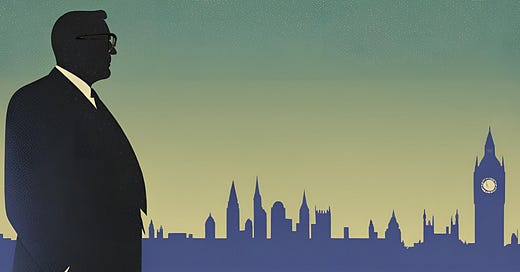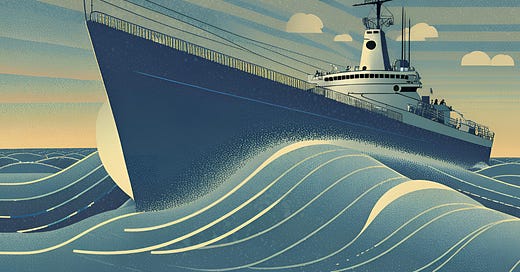
Since the Munich Security Conference two weeks ago, we have seen the transatlantic relationship come under unprecedented pressure. Donald Trump, President of the United States (US), and his administration have called into question America’s commitment to European security, begun negotiations with Vladimir Putin, President of Russia – sidelining Ukraine and other key European partners – and appears to have successfully compelled the Ukrainian Government to sign a deal handing over its mineral wealth to payback US aid since the outbreak of the war.
While the rhetoric from Trump is deeply concerning, it remains to be seen what impact the new administration will have on the global stage. So, in this week’s Big Ask, we asked seven experts: Has the world changed after Munich?
Neil Brown
Distinguished Fellow, Council on Geostrategy
Yes, no, and maybe.
Yes, because J.D. Vance, Vice-President of the US, and Pete Hegseth, Secretary for Defence of the US, exposed a profoundly different American thinking on its closest allies and Russia.
No, because the smorgasbord of words and actions that sowed so much confusion raises real questions over US competence to implement it.
Maybe, because it is unclear whether such rhetoric signals a US strategy to split Russia and the People’s Republic of China (PRC)? A rightist pro-Russia ‘putsch’? ‘Shock and awe’ to awaken Old Europe? Or even a Putin-Trump ‘thing’ which defies explanation?
From a UK perspective, the answer may depend on how Europe responds to a US message delivered in a City with such historical resonance, along with the crude ‘critical raw materials’ ultimatum to Kyiv, and the US siding with Russia at the United Nations (UN) General Assembly, that followed.
How much has changed will be clearer if:
The European Union (EU) Council responds positively to the calls for renewed funding for Ukraine and for the much-delayed EU Defence White Paper; and if Germany agrees a significant ‘work-around’ boost to its defence spending.
Britain recognises that recent US behaviour is, in part, a UK foreign policy failure; Britain did not act immediately on the Prime Minister’s own call last July for a 2.5% of Gross Domestic Product (GDP) North Atlantic Treaty Organisation (NATO) defence spending target, or retain its leadership in support of Ukraine.
We see a permanent shift from the disproportionate influence of His Majesty’s (HM) Treasury and Foreign Commonwealth and Development Office (FCDO), both tone deaf to the gravity of the geopolitical outlook and the imperative of UK leadership on Ukraine and European security. This will only be clear when we see whether last week’s spending announcement, while welcome, is the start of strategic awakening rather than just a knee-jerk reaction to Trump?
Senior Lecturer in Post-Soviet Security, King’s College London
Soon after the 2024 US presidential election, it was clear that US foreign policy was going to look radically different in a second Trump presidency. Munich made it impossible to ignore the scale of that change. For the first time since the Second World War, Europe and the US are not allies in any meaningful sense. The Trump administration has made it clear that they do not see NATO as a useful structure; that it does not respect the sovereignty of allies such as Denmark and Canada; that the EU is an economic adversary; and that it is considerably more interested in a positive relationship with Russia than in good relations with any traditional partner. Additionally, the apparent proximity to the Kremlin means the US can no longer be regarded as a reliable intelligence partner for Britain or Europe.
Beyond this realignment, the way that the US conducts foreign policy and the way it thinks about itself have changed radically. The new Trump administration appears to treat coercion as a diplomatic mechanism of first resort. It clearly doesn’t see America as the ‘shining city on the hill’, but as just another powerful state in a world where only power matters. Of course, these are two other things it has in common with the Kremlin.
The US has abandoned the idea of ‘the West’; in doing so, it has weakened itself, emboldened Moscow, empowered Beijing, and undermined European security. We are in an infinitely more dangerous world now.
Director, Mayak Intelligence
It is not that the world changed after Munich, it is rather that Munich showed us how far the world had changed. For decades, US presidents have been warning Europe that it could not continue to enjoy its security umbrella on the cheap, but in hindsight, the collapse of the Soviet Union really began the continental drift which has become so evident. The emergence of the EU as a power bloc, albeit a fractious and fissiparous one, and the Indo-Pacific’s ever-greater importance to the US made this inevitable. Furthermore, without an ideological underpinning, geopolitics were inevitably going to become more pragmatic and transactional, albeit masked in the language of democratic values and freedom.
This White House doesn’t care for niceties and is determined to wield its power unabashed. First, Hegseth laid down the law to NATO, and warned that Europe had to handle its security, including guarantees to Ukraine. Then Trump made it clear that he had no problems breaking taboos and dealing with pariahs such as Putin. Finally, it was left to Vance to warn that there was ‘a new sheriff in town’ who expected Europe to defer to Washington. It’s now up to Europe to decide if its response will be more than rhetorical.
Executive Editor, Internationale Politik Quarterly and Internationale Politik
It increasingly looks like it. The apparently unconditional US rapprochement with Moscow and the Trump administration voting with Russia (and North Korea) on a UN General Assembly motion concerning European security bodes ill, as does the new, Orwellian American shyness when it comes to describing Russia as the aggressor in its ongoing war against Ukraine.
At the time of writing it was unclear whether Sir Keir Starmer, Prime Minister, has been able to convince Trump to back up any European-led security presence after a possible ceasefire in Ukraine or, more generally, to make him return to the principles of the 1941 Atlantic Charter. But if the current American administration ends up aligning with those forces, which Roosevelt and Churchill came together to fight and beat, then the world has indeed changed.
‘A Europe whole and free’ certainly no longer seems to be a core objective of the US. Friedrich Merz, the likely incoming Chancellor of Germany, has said his impression was that the Trump administration was ‘largely indifferent’ to Europe’s fate. It may be worse. The aim could be to destroy the EU, gut NATO, atomise Europe, and neutralise it as a power centre.
Regardless of what Trump’s gonzo imperialism (which is also directed against Canada and Greenland/Denmark) is supposed to achieve, whether it will succeed, or whether domestic developments in the US will lead to its moderation or implosion – continued strong support for Ukraine and the rapid build-up of European defence and deterrence capacity is the task of the hour. It needs to happen at an unprecedented scale and will be a generational task.
Director, Strategy, Statecraft, and Technology (Changing Character of War) Centre, University of Oxford
Will we look back at the Munich Security Conference in February 2025 as a turning point in European defence? Will it embolden Russia, as so many fear? Will it mean, as Merz claims, that Trump will herald the abolition of NATO this year?
In times of uncertainty, it is better to double down on certainties. European nations have it within their power to rearm, to increase their defence capacity, and to improve their interoperability. They already share the same NATO doctrine, their air forces and their navies are interoperable, and they exercise regularly together. Their combined wealth, demography, and scientific expertise dwarfs that of Russia. It is only their unwillingness to act which gives Russia an advantage.
The US is correct to highlight Europe’s long failure to invest fully in its own defence. However, it has been quite wrong to assert that Ukraine started the war with Russia or that a condition of peace is for Kyiv to sign over the majority of its mineral rights. The Russians, who failed to overcome Ukraine by military force, despite three years’ of effort, may achieve their ends of dismembering and subjugating Ukraine by negotiations. Again, if Europe has the will, it could rearm rapidly and refuse to accept Russian domination over Kyiv. If it leaves it too late, America’s absent-mindedness and Russia’s grotesque ambition may present Europe with a fait accompli.
The Rt. Hon. Baroness Neville-Jones DCMG
Member of the House of Lords and Member of the Advisory Board, Council on Geostrategy
A new chapter in global alignments was foreshadowed at Munich. By deciding to end the war in Ukraine on terms which reward Russia for aggression and by exhibiting fundamental political differences with allies in the UN Security Council, the US has chosen, on grounds of policy priorities, no longer to be the rock of European security on which its allies can implicitly rely. Even if American policy were to revert in the future under this or a new administration, the terms will be more guarded and conditional on both sides.
In current circumstances, unless they are to allow their continent to be dominated by a predatory Russia, Europeans, working together, will need to fashion urgently shared defence capabilities sufficient to persuade the US to maintain the nuclear guarantee and thus the credibility of NATO as guarantor of freedom of political action of Europeans in their own backyard. This will be costly and will mean sacrifices. Transatlantic relationships are likely to be further complicated by American trade protectionism, which could make it very hard to get allied agreement on economic policy – especially sanctions – towards the autocracies.
The extent of political and economic disruption being caused by Trump’s wholesale attack on the fabric of American government raises the distinct possibility of mid-term economic and political crisis in the US further advantaging Russia and the PRC.
Research Fellow in Indo-Pacific Geopolitics, Council on Geostrategy
Europeans have woken up startled after years of hitting the snooze button.
It has long been clear that America’s gaze has been shifting eastwards, towards the challenge from Beijing. As such, the demand that Europeans pay more for their own defence is nothing new (nor, incidentally, is it an unreasonable ask).
For all the talk of the transatlantic alliance’s demise, the US remains committed to NATO. Hegseth, Trump’s MAGA man in the Pentagon, has spoken of ‘make[ing] NATO great again’ – albeit on the understanding that Europeans will now step up. It is wrong to allow Vance’s lecturing to drown out this reassurance.
But, of course, Trump’s transactional and capricious style means nothing can be taken for granted - Ukraine is a case in point.
Trump’s parroting of Putin is alarming. As too is his apparent willingness to abandon Ukraine’s embattled president, Volodymyr Zelensky. If Trump pushes forward with peace at any price over the heads of London and Paris, such feelings will only be heightened. The implications of this, a world in which the strong can carve up their own spheres of influence, would be immense and go well beyond Europe.
Let’s wait and see. That said, if the first month of the second Trump presidency foretells how it means to go on, the next four years of transatlantic ties will be testing.
If you enjoyed this Big Ask, please subscribe or pledge your support!
What do you think about the perspectives put forward in this Big Ask? Why not leave a comment below?












